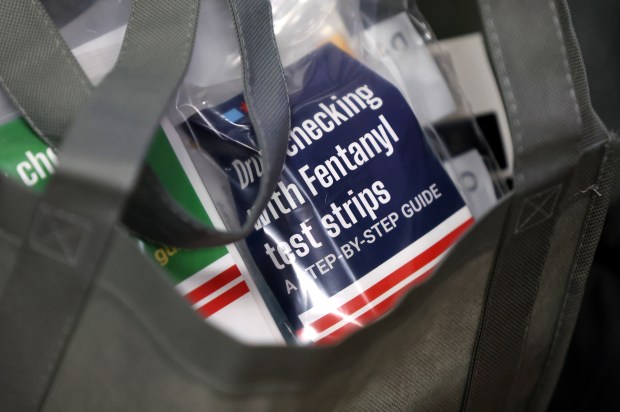When Lizzie Patterson was interning for state Sen. Laura Ellman, D-Naperville, last summer, she was given a task: develop a bill that could be taken to Springfield.
The Naperville North High School graduate started researching issues in the community, county and state that she could address with draft legislation.
Synthetic opioids — their pervasiveness and lethality — snagged her attention.
“You just hear more and more about it,” Patterson, 19, said. “Fentanyl overdoses, things being laced — it’s super dangerous.”
She decided her bill would try to tackle the epidemic by making life-saving resources more widely accessible to the public, not thinking the idea would actually have a chance at becoming a law.
But earlier this month, SB 3350 — the product of Patterson’s proposal to Ellman — advanced out of the Senate and moved to the House for further consideration. It now resides with the Human Services Committee.
If approved, the legislation would expand access to fentanyl test strips.
Known as FTS, the small strips of paper can detect the presence of fentanyl — a potent synthetic opioid — in a variety of substances, according to the Centers for Disease Control and Prevention.
Fentanyl, up to 50 times stronger than heroin and 100 times stronger than morphine, can be deadly in even small doses.
As a pharmaceutical, it can be prescribed by doctors to treat severe pain. But it also can be made illegally, often added to other drugs because of its extreme potency, the CDC says. It is nearly impossible to tell if drugs have been laced with fentanyl unless they’re tested with fentanyl strips.
SB 3350 would amend the Substance Use Disorder Act to allow the Department of Human Services to establish or authorize programs for dispensing and distributing the strips.
Under the measure, specified hospitals and other organizations deemed eligible would be enrolled to receive fentanyl test strips by participating in the state’s Drug Overdose Prevention Program.
Managed by the Department of Human Services Division of Substance Use Prevention and Recovery, the Drug Overdose Prevention Program (DOPP) currently allows organizations to order free opioid overdose reversal medication, known as naloxone, to distribute within their communities.
Organizations eligible for DOPP include local public health departments, county jails, urgent care facilities, police departments, local businesses and other organizations, according to the Department of Human Services website.
Currently, DOPP does not distribute the strips directly, according to Human Services spokeswoman Daisy Contreras. FTS are, however, accessible upon request through DHS-funded organizations across the state, Contreras said.
Asked about the bill, Contreras said her agency is “aware of the proposed legislation.”
Speaking to FTS’ impact, she said, “Distributing fentanyl test strips is a harm reduction strategy that can help people who use drugs make more informed decisions about their intake, which may help prevent overdoses.”
In Illinois, pharmacists and retailers can sell FTS over-the-counter, and county health departments are able to distribute test strips to the public for no fee.
When Patterson heard her idea to amplify those options passed the Senate, she was “really, really surprised.”
While she doesn’t personally know anyone who has overdosed on synthetic opioids, their reach and deadly impact are hard to ignore, she said.
“I just hear about it in the news,” she said. “I see it all over.”
Patterson, who now attends the University of South Carolina, said her college is “constantly telling people to never take anything from a stranger because you never know what things are laced with nowadays.”
In 2022, there were 3,261 fatalities due to opioid overdoses in Illinois, an 8.2% increase over 2021, according to the Illinois Department of Public Health. Of those, 92% involved a synthetic opioid.
Locally, there have been 18 overdose deaths — 12 involving fentanyl/heroin — so far this year in Will County, data on the coroner’s website shows. In 2023, there were 141 overdose deaths, 95 involving heroin/fentanyl.
DuPage County runs a program that ensures access to Narcan, a form of naloxone, by making it available to people by mail or at designated locations throughout the area.
In 2023, 157 overdoses were reversed with the use of Narcan in DuPage, the health department spokesperson said.
The department also employs State Opioid Response Grant funding, administered through the federal Substance Abuse and Mental Health Services Administration, to pay for and distribute FTS to partnering agencies. Some 5,900 strips were distributed in 2023.
Ellman said that while there is existing programming and grant funding to tackle the synthetic opioid epidemic, “at every level it needs to be addressed in a variety of different ways.”
When Patterson proposed the idea, Ellman thought, “You know what, let’s do this,” she said.
“We need to protect people from fentanyl through law enforcement, through education, through harm reduction,” she said. “So we’re going to keep going until this problem is solved.”




